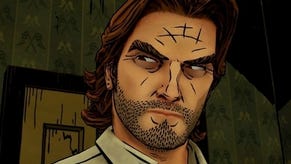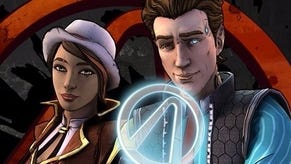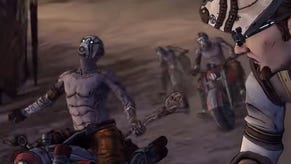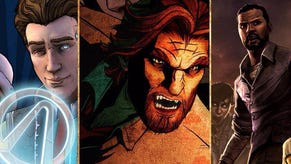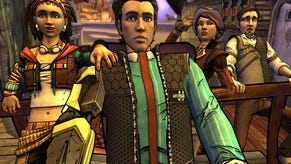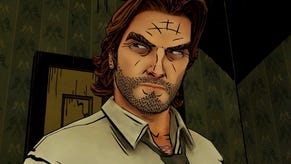Tales from the Borderlands Season One review
A Handsome Jack of all trades.
What a weird trajectory Borderlands has had. Its debut effort was originally going to be a fairly gritty apocalyptic space marine matinee before Gearbox decided to drastically revamp its art style and tone for a more comic book-inspired approach. From what I gather, having never played it, it was an enjoyable co-op action-RPG with a lacklustre story and an abundance of brown. Gearbox addressed these concerns by creating a more colourful sequel, both literally and figuratively, with a wide array of whimsical characters and witty banter. It became such a phenomenon that you didn't need to actually play it to know who Claptrap or Tiny Tina were; they simply became ubiquitous mascots in the AAA space. Head to the nearest video game convention and Borderlands would be rivalled only by Assassin's Creed for inspiring the greatest number of cosplayers.
But at its heart Borderlands was always a shooter. You ran around and killed things while its greatest drama occurred off-screen as players collaborated on the best way to tackle its bandits, psychos and mutants. One married couple even attributed their relationship to bonding over Gearbox's shooter before exchanging vows at the developer's panel. But would there really be enough substance for Telltale, a studio focused on narrative adventures, to craft a compelling story out of?
The answer is a resounding yes. Borderlands wasn't created to tell a story, but Telltale has spun Gearbox's wild world of barren badlands and big business into a captivating space western worthy of the studio's best efforts like The Walking Dead and The Wolf Among Us.
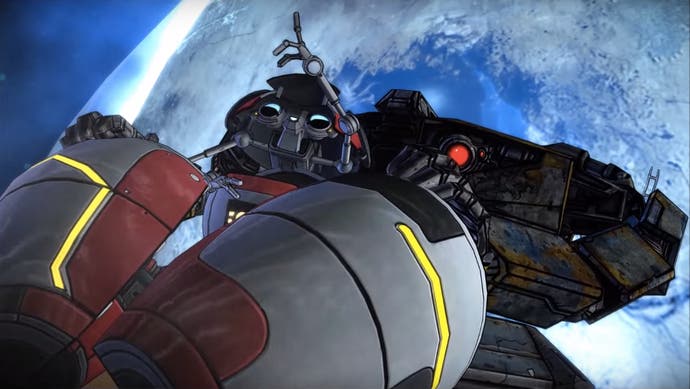
Our tale begins after the events of Borderlands 2. Vainglorious villain Handsome Jack, a dashing weapons tycoon and dictator (think Tony Stark by way of Donald Trump), has been killed and his mega-corporation Hyperion is in need of a new leader. A slimy salaryman named Vasquez (wonderfully voiced by the great Patrick Warburton) has risen the ranks through brute force and cocky company man (and player character) Rhys has found himself demoted to assistant vice janitor. In order to undermine his boss and usurp control of Hyperion, he cooks up a scheme to nab a Vault Key, a highly prized macguffin that leads to untold riches. Meanwhile, a grifter named Fiona (the game's second player character) and her sister Sasha are setting up a similar score to smuggle the same treasure.
The two player characters' fates are intertwined both in the past and present as we frequently cut ahead to our heroes being held captive by a mysterious masked stranger. This leads to a lot of humorous Rashomon-inspired gags as the two take turns telling their version of how things went down to their captor. It's a funny conceit as both Fiona and Rhys embellish their versions of what happened to a comical degree. Yet Telltale smartly doesn't overplay it by subtly dropping this joke just as it starts to wear thin after a couple of episodes.
The writing remains whip-smart throughout the entirety of its five episodes. Rarely did I go more than a few minutes without laughing. Whether it was a hilarious character intro freeze-frame, a great line read by its incredible cast, or one of its inspired musical opening credits sequences, Tales from the Borderlands' retains its wit and charm throughout. My only qualm with its storytelling is its final scene that's focused more on setting up another season than providing closure. As a standalone product, this is disappointing, but I prefer to look at Tales from the Borderlands as the first season in a TV show as there will almost definitely be more (though Telltale hasn't officially confirmed that yet).
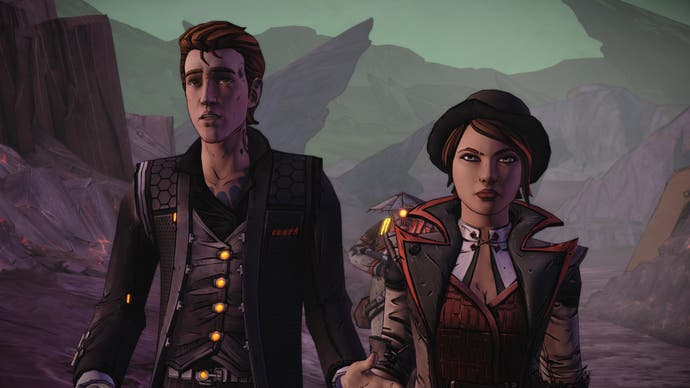
Like The Walking Dead and The Wolf Among Us before it, Tales From the Borderlands is a redemption story. And in many ways, it's Telltale's most successful stab at a playable character arc. Where Lee Everett and Bigby Wolf's sins were frequently discussed, their less desirable tendencies were jettisoned as backstory. By the time we entered their stories they simply became brooding badasses with hearts of gold. That's not the case with Rhys and Fiona. Both are introduced here as selfish jerks. Rhys isn't trying to save the world or protect anyone; he just wants an executive office and the status and power that comes with it. Fiona's street urchin upbringing makes her more sympathetic, but she's still a grifter, trained only to look out for herself and her sister.
Yet the more we see of this world, the more sensible these characters seem. Neither Rhys nor Fiona were born bad, but are simply the products of their own greedy, violent environment. Watching them mature, forge friendships, and take down the bad guys is incredibly endearing. Our bonds to them are further strengthened by the fact that we control many of their choices, so it feels as if we're helping them grow. In a way, the player/character relationship recalls that of Lee and Clementine in The Walking Dead: Season One (and anyone who says they didn't love Clementine is clearly a liar). Yet these lovable scoundrels never completely shed their demons, making their growth feel organic and believable. The world(s) of Borderlands may be cartoonish and comical, but its heart is raw and beating.
The supporting cast is just as well-rounded with its ragtag gang of thieves, assassins, con artists, mercenaries, and Vault Hunters all appealing with their peculiar mix of plucky charm and alarming instincts for violence. They're also full of surprises adding further depth to the archetypes they first appear to be. Rhys' best friend Vaughn is a small nebbish fellow who surprisingly sports a six pack and reveals himself to be shockingly resourceful; Athena is a badass bounty hunter, but also a domestic sweetheart to her hardworking mechanic girlfriend; and Handsome Jack, who reprises his role as an AI, is equal parts menacing and charismatic with undertones of deep sorrow.
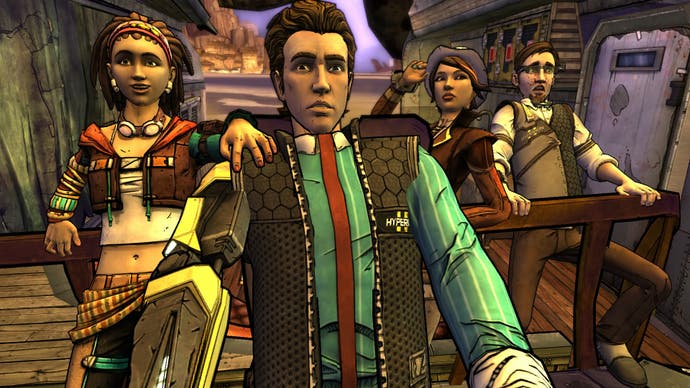
It's a credit to both Telltale and Gearbox that the Borderlands universe is as wildly creative and malleable as it is. It produces an odd flavour that merges the violent pulp of Mad Max with the corporate satire of Office Space. I suppose Firefly or Futurama would be the closest pop culture comparisons, but it still feels fresh and original even if it's cut from the same cloth as other cult favourites.
Decisively, there's little about the way Tales from the Borderlands actually plays that separates it from other recent entries in Telltale's repertoire. You simply make various decisions and engage in the occasional quick-time event. It's worth noting that these action sequences have come a long way since Telltale first started experimenting with the formula in Jurassic Park - an extended shootout in Episode Four is probably the most thrilling, and funniest, action setpiece Telltale has ever attempted. Anything resembling a puzzle is as simple as exploring a screen or two and merely clicking on everything highlighted. It's these rare sequences when the pacing takes a hit, but they seldom last for more than a couple of minutes at a time. I suspect some will complain that there isn't enough "gameplay" here to satiate Borderlands veterans, but I'm of the belief that Telltale's narrative driven content works best the less it allows you to wander.
While Tales from the Borderlands is mechanically similar to past Telltale games, the Borderlands package it's wrapped up in is more than skin deep. Fiona's inventory recalls the UI of its source material and it can be used to buy different clothes for your characters - a meaningful interaction in a series so beloved for its costuming. Meanwhile, Rhys has a cybernetic eye that can scan objects for humourous descriptions of them. Combined with Gearbox's inspired art direction, Tales from the Borderlands feels remarkably rooted in Gearbox's franchise. In fact, Gearbox even allowed Telltale to take some pretty big liberties with the fate of its characters.
Tales from the Borderlands is much, much better than it seemingly has any right to be. What at first may resemble a licensed cash-in for a popular shooter has turned into Telltale's finest work to date. It retains the emotional punch and complex characters of The Walking Dead while resurrecting the humorous side of Telltale the studio excelled at with titles like Sam & Max, Strong Bad's Cool Game for Attractive People, and Tales from Monkey Island. Telltale has also fine-tuned the pacing issues and technical foibles the held back its last generation of episodic adventures and it found an art style that both looks great and remains true to its source material. Tales from the Borderlands may not be a shooter, but it's firing on all cylinders.



